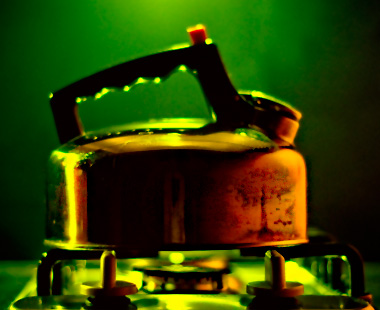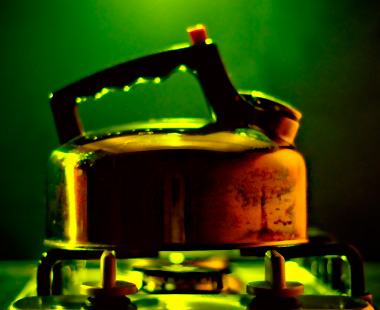Send your question to Umbra!
Q. Dear Umbra,
My wife would like to remodel the kitchen. This frightens me, personally, but I look it as an opportunity to buy some more energy-efficient appliances. Right now we have an ancient electric stove. Would replacing it with a natural gas stove be more efficient, or should we stick with electric and just go for a newer model? (Of course we would go for the greenest option available when it comes to electricity.)
Mike
London, England
 Is remodeling brewing in your near future? Make it green.Photo: Josh PesaventoA. Dearest Mike,
Is remodeling brewing in your near future? Make it green.Photo: Josh PesaventoA. Dearest Mike,
Greetings from across the pond. I raise my cup of organic Earl Grey to you for casting aside your kitchen remodeling fears and seeing this as a chance to cut your kitchen’s energy consumption.
When it comes to efficient cooking, you have a range of options (o ho ho!). While the U.S. Energy Star system doesn’t rate energy-efficient ranges, a gas one may be slightly more efficient if you already have a natural gas line. (The heat is instant and can be easier to control than with electric burners.) In addition, foodies seem to prefer cooking with natural gas. However, drilling for natural gas can be really fracking destructive, and its overall emissions may be more environmentally harmful than previously realized. Bottom line is, investigate where your area’s power comes from — Seattle’s is over 90 percent hydropower — and whether your utility provider offers green electricity (it sounds like it does).
When it’s time to fire up your burners, remember these tips from Energy Star:
- Match your burner size to your pot or pan size — a small pot on a large burner wastes energy.
- If you go with gas, keep the burners clean. And have them fixed if you see a yellow flame instead of a blue one.
- Keep heat from escaping by covering your pots and pans.
While we’re at it, Mike, let’s talk microwaves. I’ve touched on their efficiency before, saying, “Microwaves are generally less efficient than electric stoves but more efficient than gas stoves. However, quantity makes a difference: If you crave just one cup of tea, the microwave oven would be a better choice than heating the habitual pot of water on either type of stove.” Indeed, Energy Star tells us that nuking small portions can use up to 80 percent less energy than other reheating methods. During the summer, they’ll also heat your home less. Just something to think about.
The bigger picture here, Mike, is that your kitchen remodel is the perfect time to upgrade to more efficient kitchen items — like the refrigerator. The energy used from cooking on the stove is pretty small. The refrigerator, however, is one of your home’s biggest energy-sucking appliances [PDF]. If yours is an old, inefficient model and you can spring for a new one, do (and consider whether you can get a slightly smaller one).
Heatedly,
Umbra



